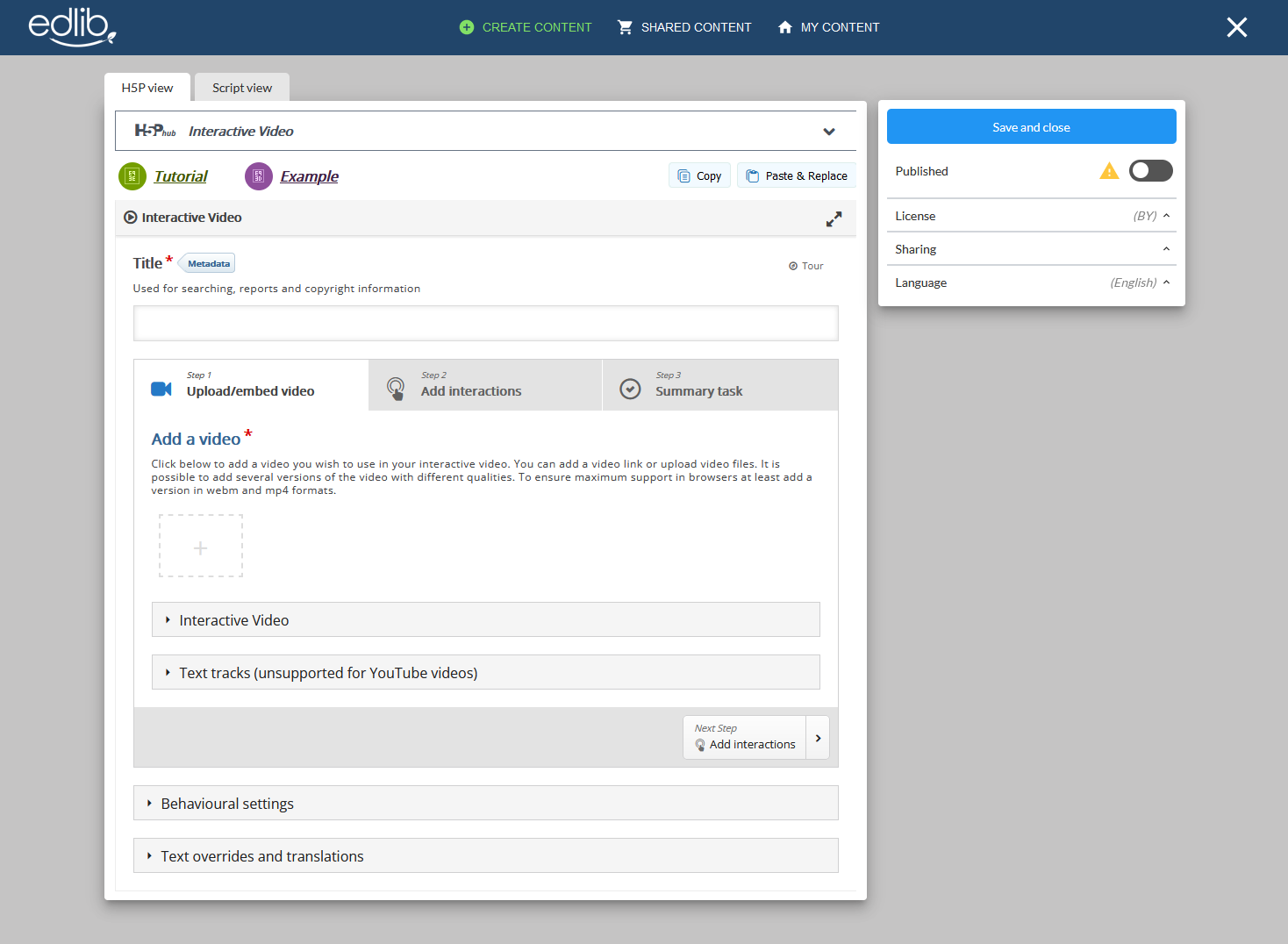Features
Edlib is continuously evolving with existing features being refined and new features being added. The following is a list of major features, several of which are in active development.
Existing Features
- Support for all H5P open-source content types, some of which are highlighted below:
- Interactive video: An interactive video content type allowing users to add multiple choice and fill in the blank questions, pop-up text and other types of interactions to their videos.
- Course presentation: A presentation content type which allows users to add multiple choice questions, fill in the blanks, text, and other types of interactions to their presentations.
- Flash cards: Interactive flashcards. Create a set of stylish and intuitive flashcards that have images paired with questions and answers.
- Quiz: A content type allowing creatives to create quizzes. Many question types are supported like multiple choice, fill-in-the-blanks, drag-the-words, mark-the-words and regular drag-and-drop.
- The Hub to easily find and re-use existing Edlib content. Content can be filtered by H5P content type, tags and so forth.
- Licensing module with an intelligent Creative-Commons license selector.
- Authoring workflows including the ability to maintain resources private or to make them publicly available.
- Collaboration functionality for content creators.
- Easy integration with third-party APIs including audio, video and image APIs.
- The ability to create quizzes and game-based learning activities quickly and easily from the integrated question bank.
- Integrate against the LMS of your choice. Through LTI you can track results directly in your learning management systems.
- More and better usage tracking with analysis will help you understand your students and create even better content.
- Resource versioning.
- The ability to easily and quickly create language variants of the same underlying resource.
H5P
H5P is a powerful content creation platform for learning resources. H5P makes it easy to create, share and reuse HTML5-based interactive content. H5P enables everyone to create rich, interactive learning experiences more efficiently.
H5P content is responsive and mobile-friendly allowing for the same rich, interactive content on desktop computers, smartphones and tablets alike.
The Hub
The Hub allows you to easily find and re-use existing Edlib content. Content can be filtered by H5P content type, tags and so forth. In addition sorting by views statistics, cration date and last date for edit, is possible.
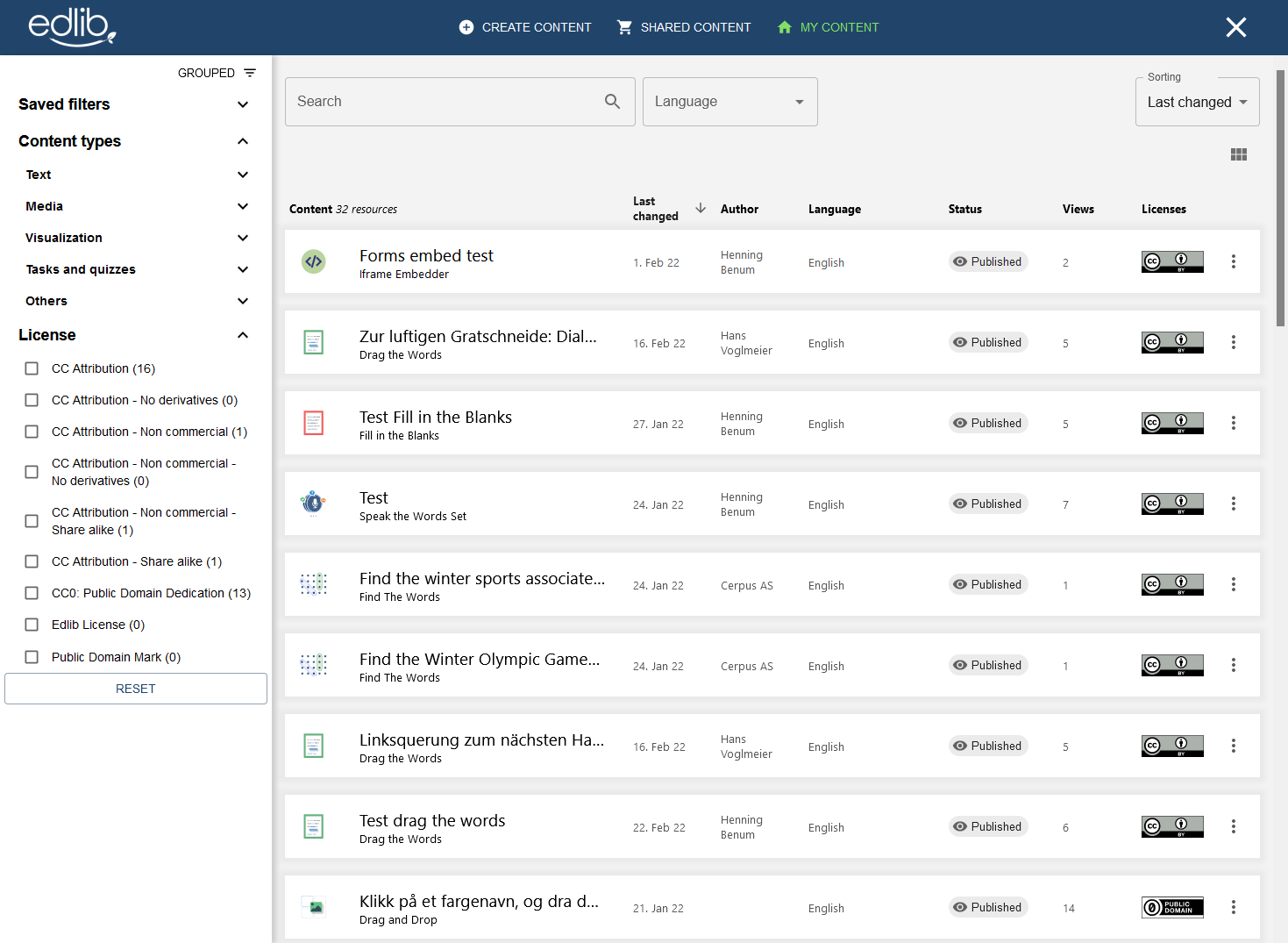
Image: The Hub
Content Author
Edlib's LTI tool Content Author, provides quick access to purpose-built content authoring environments for all H5P open-source content types.
Resource Versioning
Whenever a user saves a resource within Edlib, a new version is created and placed within the version tree belonging to this version. The Version API and the Resource API work together to keep track of versions and resources. However, this data structure is due for significant refactoring - making the logic more accessible and easy to implement.
We believe that working with resources in a draft state while having a published version in a "live context" must be possible. Keeping a tight and understandable version control and overview is paramount to assure that the user's needs are met.
Language Support
Hand in hand with versioning comes language. Edlib tries to visualize how resources are connected as language copies to enrich the data we serve our users. This means that when someone makes a copy of a resource and changes the language on the copy, Edlib keeps track of the link between the two resources and can provide an overview highlighting this connection when displaying resources.
Edlib distinguishes between a regular copied resource and a language copy as part of sorting what kind of connection exists between resources.
"Translation is the communication of the meaning of a source-language text by means of an equivalent target-language text." (The Oxford Companion to the English Language, Namit Bhatia, ed., 1992, pp. 1,051–54).
Translating content and making it available through search are vital features for Edlib and, most importantly, for creating a good service for handling OER resources across users. We believe in sharing the "goods," and spreading the knowledge and translations is a perfect way to do it!
Features in Development
- The "Doku" content type which allows for the bundling of multiple resources into a collection of resources and/or the further contextualisation of H5P-based resources with supplementary content —or instructions— effectively converting an interactive resource into a full-fledged learning resource.
- The ability to include a recommendation engine to surface relevant content for course and game creators (currently in closed-beta).
- The Question Bank service to assist with the auto-generation of, for example, H5P Question Sets or educational games.
- The ability to share content to individual users, groups of users or as private resources that are only accessible by means of the accompanying resource links. Users should also be able to easily and correctly license content by means of a simple choice-based license selector (based on Creative-Commons licenses).
The "Doku" Content Type
The Doku content type is a block editor which allows the user to add block-based content (for example, text, H5Ps, videos and images) to a vertically-aligned collection of content.
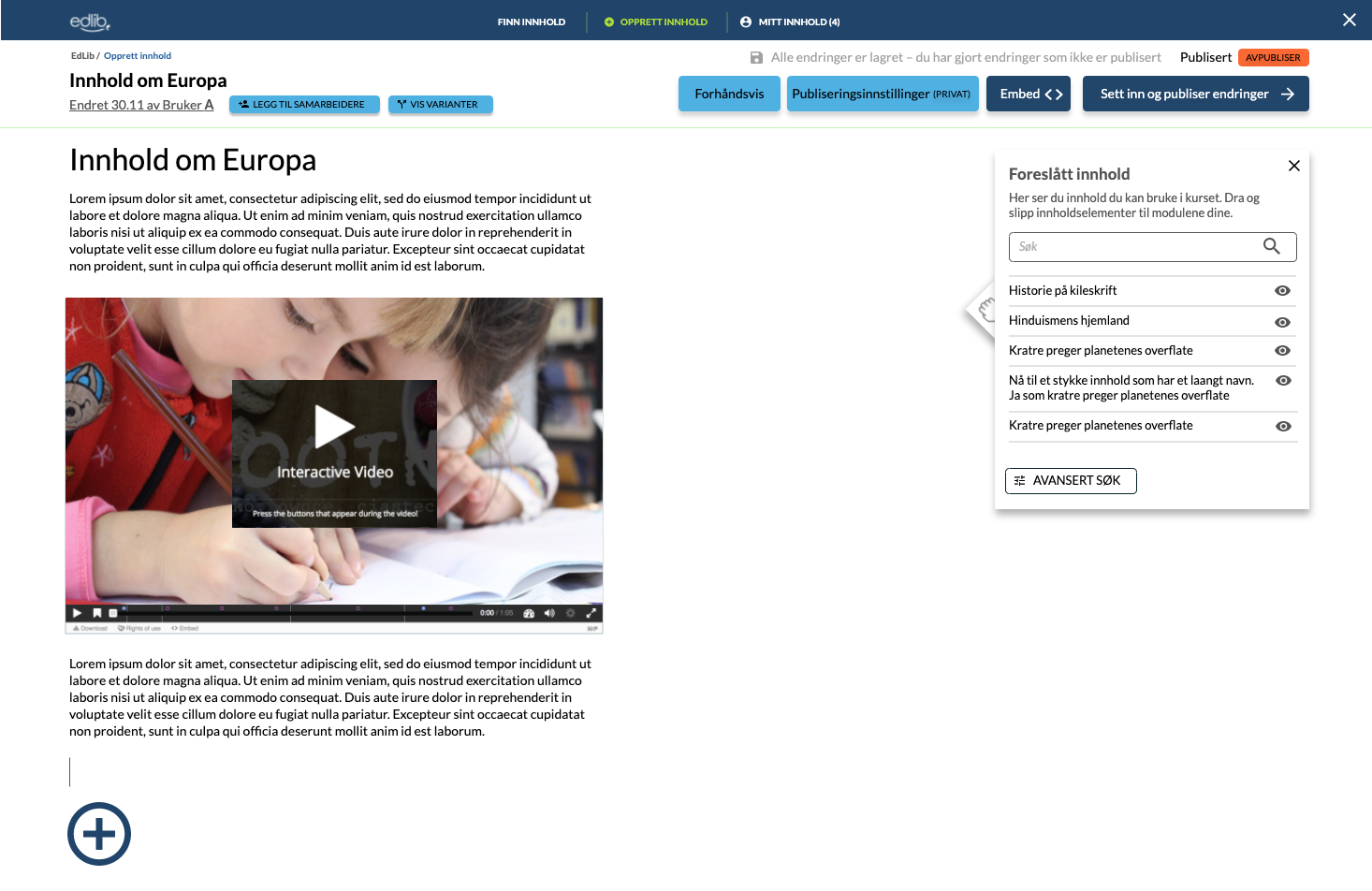
Image: Edlib Doku (block) editor
From a combined pedagogical and technical point of view, the Doku content type provides the first level of formal context: it allows for the grouping of the individual resources themselves (and related information and instructions) into a larger context ultimately resulting in a full-fledged learning resource. The Edlib Content Explorer combined with the Edlib recommendation engine will provide the Doku (block) editor with access to the lowest atomic level of EdLib resources —H5Ps— from which the user can choose to build the contextualised learning resources.
Recommendation Engine
The recommendation engine recommends and ranks relevant content (for course and game creators) based on three main information sources:
- Content together with its metadata
- Collections of content
- Learning outcomes
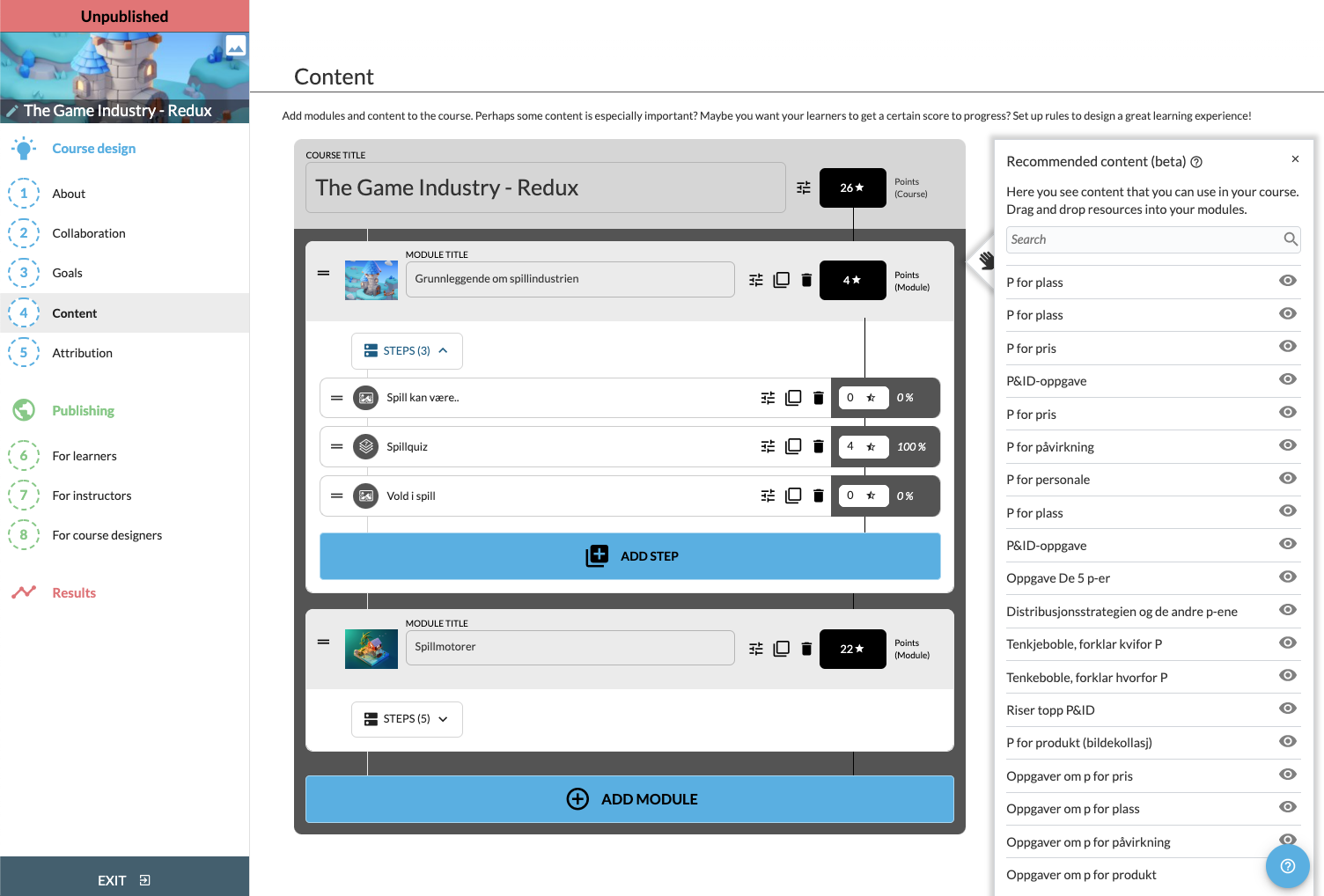
Image: Recommendation Engine in the Edstep course builder (with suggestions from the Recommendation Engine on the right-hand side of the screen)
What's more, the recommendation engine provides a set of APIs to work with content, collections and recommendations. Finally, the recommendation engine also provides an administrative interface to manually manage content, collections and to tweak ranking parameters.
Question Bank
The Edlib Question Bank is a separate Edlib service to manage question sets and related answers. Question sets can be tagged and categorized. What's more, individual answers have a "degree of correctness" property allowing for questions and the accompanying answers to go beyond the rigid right vs. wrong dichotomy.
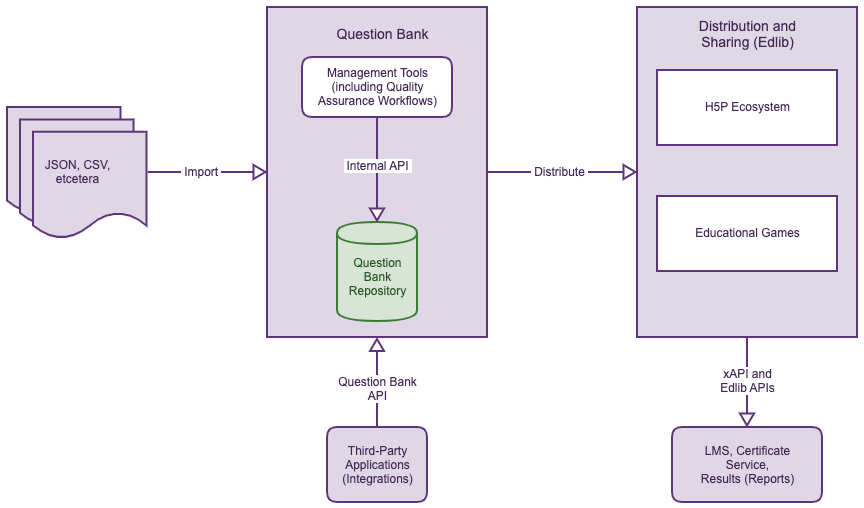
Image: Edlib Question Bank high-level architecture
Currently, the Edlib Question Bank is used by Gamilab.com to generate "Who Wants to Be a Millionaire", an educational quiz game.
